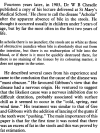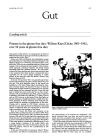Murph
Senior Member (Voting Rights)
Before coeliac disease was understood, there was the banana diet. It was something of a joke at the time, but coeliac disease was fatal for children and so people were desperate. We now know that it would work as a coeliac treatment and why. Today it seems far less crazy. But at the time the banana diet was a medical mystery. Its proponents thought there was something in the bananas that helped. And they applied it incorrectly, discontinuing a pure banana diet once the child was older.

I like to think about the banana diet when I survey the scene of me/cfs. Is it possible that among our interventions is one that contains within it the germ of a proper solution?
Perhaps, perhaps not. But I think pacing is probably the best candidate. We all know pacing reduces symptoms. You even hear stories of people who paced well for a long time and improved their baseline. What specifically is pacing doing? Is there a way to amplify its effectiveness?
'Spontaneous' remissions, improvements and even cures are sometimes seen. This is not a disease that offers a fast track to disability for everyone. I find that makes me more open minded to the idea that, just possibly, certain combinations of conditions can provide relief - conditions that a person could conceivably stumble into in normal life. Of course, certain combinations of conditions make people worse too, so trying things is very risky!
This post is offered up as a prompt for discussion. Perhaps it is not useful as a discussion, which is fine. Perhaps it even offends people - in which case I apologise. But I really like to consider the way the world looks in the lead up to a cure, and what I take from coeliac is that something resembling a cure can pre-exist and even be in use before the scientific basis for it is discovered. If there's a general principle of what those sorts of things might look like ex-ante, I'd like to know!

I like to think about the banana diet when I survey the scene of me/cfs. Is it possible that among our interventions is one that contains within it the germ of a proper solution?
Perhaps, perhaps not. But I think pacing is probably the best candidate. We all know pacing reduces symptoms. You even hear stories of people who paced well for a long time and improved their baseline. What specifically is pacing doing? Is there a way to amplify its effectiveness?
'Spontaneous' remissions, improvements and even cures are sometimes seen. This is not a disease that offers a fast track to disability for everyone. I find that makes me more open minded to the idea that, just possibly, certain combinations of conditions can provide relief - conditions that a person could conceivably stumble into in normal life. Of course, certain combinations of conditions make people worse too, so trying things is very risky!
This post is offered up as a prompt for discussion. Perhaps it is not useful as a discussion, which is fine. Perhaps it even offends people - in which case I apologise. But I really like to consider the way the world looks in the lead up to a cure, and what I take from coeliac is that something resembling a cure can pre-exist and even be in use before the scientific basis for it is discovered. If there's a general principle of what those sorts of things might look like ex-ante, I'd like to know!



